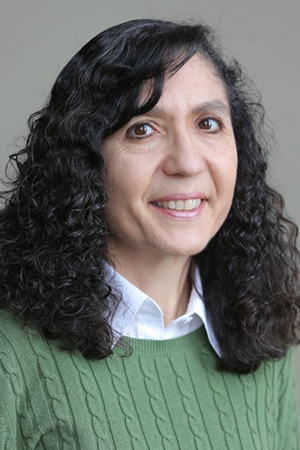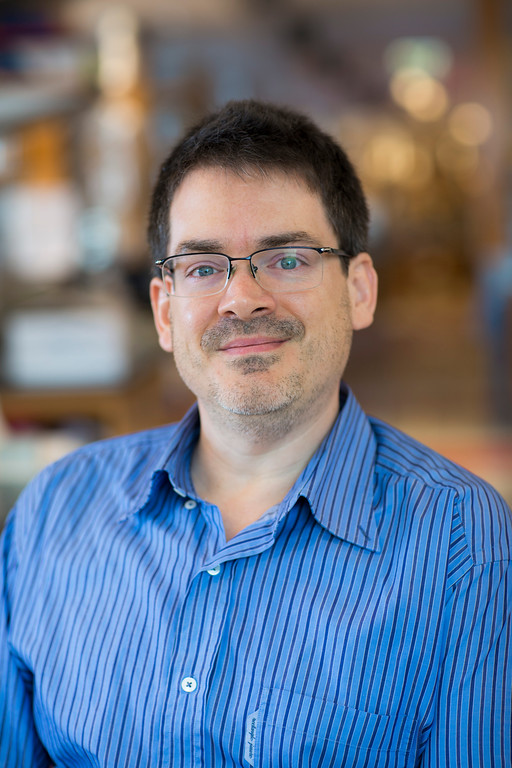RFA: Bridge Funding for Research
We are pleased to announce the recipients of Bridge Funding Awards for the 2025-2026 fiscal year within the College of Medicine and Life Sciences. After a rigorous review process, the following individuals have been selected for their outstanding research and potential for future funding:

Dr. Ivana de la Serna
Associate Professor
Department of Cell and Cancer Biology
Dr. de la Serna’s project, “Inhibiting the SWI/SNF Bromodomains in Melanoma” will receive bridge funding. This funding will enable her to investigate how inhibiting the SWI/SNF bromodomains within the BRD7 and BRD9 components of SWI/SNF chromatin remodeling complexes can enhance the effectiveness of targeted and immunotherapies, as well as prevent the development of drug resistance. Dr. de la Serna discovered that components of the SWI/SNF complex represent a lineage-dependent vulnerability in melanoma, and that pharmacological inhibition of SWI/SNF results in significant anti-tumor effects. This funding will help address reviewer’s concerns on her R01 application.

Dr. Ipe Ninan
Associate Professor
Department of Neurosciences and Psychiatry
Dr. Ninan’s project, “Serotonin-mediated reorganization of the adolescent medial prefrontal cortex,” will receive bridge funding to continue gathering preliminary data for his RO1 application. Dr. Ninan’s research will help to determine whether and how the activation of serotonin signaling during adolescence reverses anxiety-related behaviors.
We congratulate the recipients and wish them continued success in their research endeavors. The Bridge Funding Awards are crucial for ensuring the continuity of high-impact research at our institution, and we are proud to support our faculty in their pursuit of innovative scientific discovery.
Applications were submitted this spring and reviewed by the Research Advisory Council. Successful applicants were notified of their awards in June.
Application Process
We are pleased to announce the next RFA for Bridge Funding. The pertinent details required for preparation of an application are listed below. Applications that are incomplete or do not meet the eligibility criteria will not be considered.
Important Deadlines
- Application deadline: Extended to April 4, 2025
- Review assignments: April 4, 2025
- RAC review: April 30, 2025
- Award announcement: No later than May 9, 2025
Sections: Eligibility | Awards | Application Instructions | Review Process | Recipients
Eligibility:
Any full-time faculty member, in any track, who is the Principal Investigator (PI) or Multi PI (MPI) on a project funded by a national agency with a peer review process (e.g. NIH, NSF, American Heart Association) and awarded through the University of Toledo for at least two consecutive years preceding the bridge funding request, and whose application for new or continued support from that or another funding agency has not been funded, will be eligible for bridge funding. Projects currently funded via the medical research society (MRS) grants or any internal funding mechanisms are not eligible for bridge funds.
Bridge funding will only be provided for the continuity of a funded research program. It is not intended to support pilot studies or programs that have not had recent funding. Grants that are primarily for a demonstration project, a training program, or a postdoctoral fellowship are ineligible.
Candidates for bridge funding must have submitted an unsuccessful new or renewal application during the past 12 months. Summary statement from the latest review must be attached to the bridge grant application.
Applicants must show that they have lost, or will lose, a substantial portion of their extramural funding within twelve months of the bridge funding application. Applicants with major extramural funding (>$100,000 direct cost/year) or startup funds of ≥$100,000 beyond the 12 moths are not eligible.
Awards:
Bridge funding awards will be limited to $50,000 and a maximum of one year or until the grantee re-establishes funding from other sources, whichever comes first. Smaller awards may be made at the discretion of the review panel and/or the Dean of the COMLS. In the event that the PI’s extramural grant is funded during the period of bridge support, unexpended funds will be returned to the College of Medicine and Life Sciences.
Awards may be used to support supplies, small equipment, lab personnel (excluding graduate students), and animal care. Bridge funding may not be used to support salaries and benefits of tenured and tenure track faculty members, new faculty start-up packages, travel to scientific conferences, graduate student stipends, administrative costs (e.g. department surcharges for service contracts) and budget deficits. If core lab services are required, this should be covered through the PI’s department chair or via request for core cash as stipulated earlier in this document.
Application Instructions:
Applications for bridge funding must be in the form of a single pdf file (except for the cover letter that has any conflicts of interests detailed) containing the following items:
-
A cover letter stating the basis for the request and the ways in which the PI has met the criteria for eligibility.
-
A 2-page summary of the research for which bridge funding is requested. This should not contain extensive experimental detail. Rather, it should describe: (a) the specific aims; (b) the significance of the work; and (c) why bridge funding is necessary.
-
A list of the PI's active grants and pending grant applications (even if not funded) for the last three years. Provide an abstract for each project listed.
-
A Summary Statements (critiques) and priority/percentile scores relevant to the bridge funding application.
-
A concise and realistic point-by point list (2-page limit) of the studies that will be done with the bridge funds, explaining how they will address the concerns raised in the prior review and strengthen the intended resubmission. Include a projected date for resubmission.
-
A budget page detailing how bridge funds will be utilized with justifications.
-
A NIH-style biographical sketch for the PI.
-
A letter of support from the applicant’s Department Chair that includes: (a) an assessment of the likelihood of future funding; (b) a candid assessment of the options for continuation of the research in the event extramural funding is not obtained; (c) evidence that the department is contributing to the continuance of research operations in an appropriate manner (e.g., graduate student support, access to essential equipment, allocation of sufficient lab space), and 4) a description of any mentoring efforts to help the PI improve the grant application.
Completed applications (complied into a single PDF including the cover letter) should be submitted to Mary Ann Schuster via email: MaryAnn.Schuster@utoledo.edu.
Review Process:
Once the applications are received, they will undergo initial screening to be sure that they are complete and meet the eligibility criteria. Review of scientific merit will be conducted and the application ranked by the Research Advisory Council (current roster attached, subjected to change) in a NIH Study Section format with written comments. Please indicate any potential conflicts of interests in your application. Final decisions regarding disbursement of awards will be made by the Dean.
2024-2025 Research Advisory Council Roster
- Jian-Ting Zhang, Ph.D. (Chair) – Cell and Cancer Biology
- Robin Barry, Ph.D. – Family Medicine
- Basil Akpunonu, M.D. – Medicine
- James Burkett, Ph.D. – Neurosciences and Psychiatry
- Rujun Gong, Ph.D. – Medicine
- Rajesh Gupta, M.D. – Medicine
- Steve Haller, Ph.D. – JCCTR (ex officio/non-voting)
- Champa Jayasuriya, Ph.D. – Orthopedic
- Bina Joe, Ph.D. – Physiology and Pharmacology
- Beata Lecka-Czernik, Ph.D. – Orthopedic
- Andrea Kalinoski, Ph.D. – Surgery
- Kevin Pan, M.D., Ph.D. – Medical Microbiology and Immunology
- Mehmood Rashid, M.D. – Neurology
- Robert Smith, M.D., Ph.D. – Neurosciences and Psychiatry
- Travis Taylor, Ph.D. – Medical Microbiology and Immunology
- Charles Thodeti, Ph.D. – Physiology and Pharmacology
- David Walczak, M.B.A. – Dean’s office
- Xin Wang, Ph.D. – Neurosciences and Psychiatry
- Yue Zou, Ph.D. – Cell and Cancer Biology
Previous Recipients
2024-2025 Recipients
We are pleased to announce the recipients of Bridge Funding Awards for the 2024-2025 fiscal year within the College of Medicine and Life Sciences.
After a rigorous review process, the following individuals have been selected for their outstanding research and potential for future funding:

Dr. James Burkett
Assistant Professor
Department of Neurosciences
Dr. Burkett’s project, “Developmental pyrethroid exposure in the prairie vole as a
model of environmental risk for autism,” will receive bridge funding to continue gathering
preliminary data for his R01 application. Dr. Burkett's research will help to determine
how environmental risk factors contribute to the etiology of autism by testing the
hypothesis that developmental pyrethroid pesticide exposure causes dose-dependent
changes in autism-relevant outcomes in prairie voles.

Dr. Yue Zou
Professor
Department of Cell and Cancer Biology
Dr. Zou’s project, “ATR Isomerization-Based Mitochondrial Apoptosis Priming in Cancer and Therapeutic Resistance,” will receive bridge funding to investigate the role of mitochondrial ATR in oncogenesis and apoptosis. Dr. Zou discovered that ATR exists in two different isoforms: a nuclear form involved in DNA damage signaling and a mitochondrial form that contributes to oncogenesis and therapeutic resistance by binding to tBid. This funding will help address reviewer’s concerns on his R01 application.
We congratulate the recipients and wish them continued success in their research endeavors. The Bridge Funding Awards are crucial for ensuring the continuity of high-impact research at our institution, and we are proud to support our faculty in their pursuit of innovative scientific discovery.


